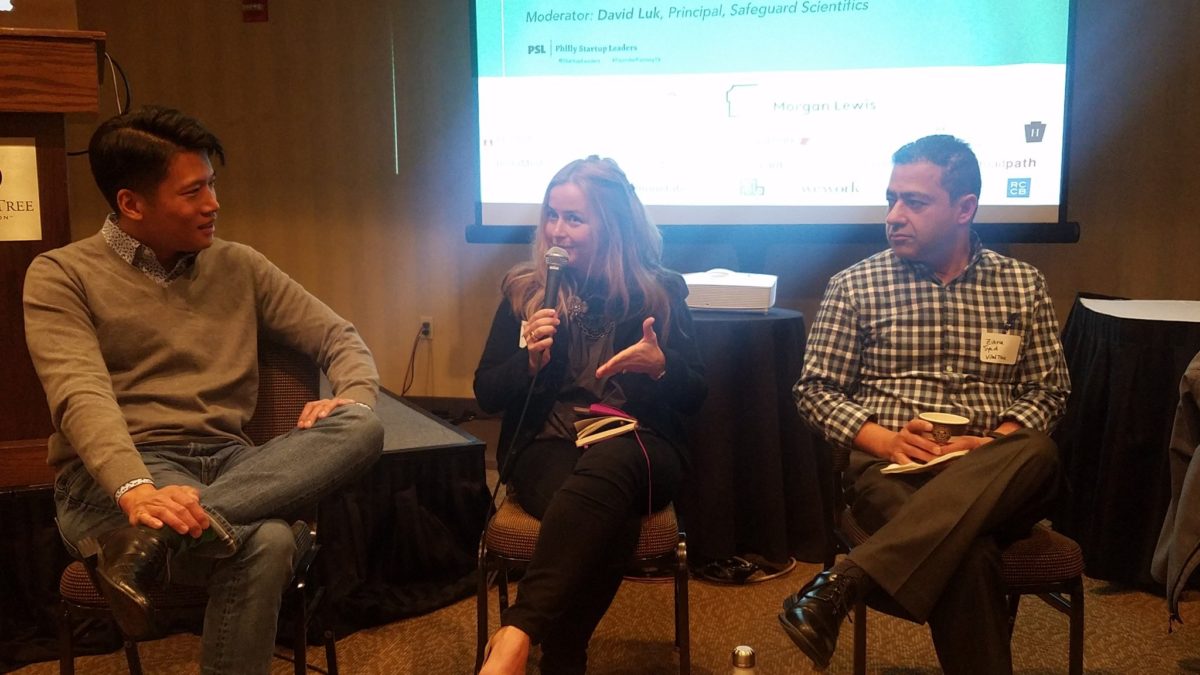Landing that first enterprise client can be a make-or-break moment for a startup.
And in the healthcare industry, where sale cycles can be painfully slow and regulations abound, getting that first check can be even more vital.
Led by Safeguard Scientifics’ David Luk (aka the guy who’s leading the charge on the Safeguard side for a $6 million effort to fund early-stage health IT startups in the region) and joined by Jefferson’s vice president of innovation Neil Gomes, three healthcare entrepreneurs sat down at Founder Factory — Philly Startup Leaders’ flagship conference — to share their memories from their first deals. (Find our other coverage of Founder Factory 2016 here.)
Christina Lopes, cofounder of The One Health Company
“We reached out to a senior person [in the field] to sell him on our story,” said Lopes, the cofounder of the clinical trial company. She didn’t name the researcher but said he was a chief science officer at a medical foundation. The company had an initial conference call with researchers to pitch its clinical trial platform.
“Honestly, we weren’t ready,” Lopes recalls. “We didn’t perform as I would have liked.”
But the company didn’t give up. Another attempt came by way of a lunch meeting with an industry champion. There was a mountain of questions, but the meeting led to setting up a webinar with other researchers to learn more about the platform. “And then it was like turning on a water fountain,” Lopes said.
Zikria Syed, CEO of VitalTrax
Funnily enough, VitalTrax — a University City-based patient engagement solution — got its first check from Lopes’ company. But then again, Syed was already a relatively established entrepreneur: he was the founder of NextDocs, which was acquired by Aurea Software in 2015.
So, perhaps Syed’s most telling “first client” experience was actually with NextDocs. Though he offered the disclaimer that back then the first check was cut by a personal friend, he said landing that first crop of clients that got the ball rolling was due to enthusiasm and confidence in the product.
“Convincing clients means passion,” Syed told the audience at Founder Factory. “Don’t hold back or be modest in terms of your passion and vision. But once you’ve done that, don’t pretend to be bigger than what you are.”
David Lindsay, cofounder of Oncora Medical
In one word, Lindsay said the secret behind signing up the University of Pennsylvania as one of the company’s early research partners was persistence. (That, and his ties to the community, led the company to raising $1.2 million in seed cash earlier this year)
“One of the keys that I found was staying around and not giving up,” he said. “These institutions move a little slower than other companies, so it was our persistence and willingness to work with physicians and that made a big difference.”
Join the conversation!
Find news, events, jobs and people who share your interests on Technical.ly's open community Slack

Philly daily roundup: Earth Day glossary; Gen AI's energy cost; Biotech incubator in Horsham

Philly daily roundup: Women's health startup wins pitch; $204M for internet access; 'GamingWalls' for sports venues

Philly daily roundup: East Market coworking; Temple's $2.5M engineering donation; WITS spring summit

